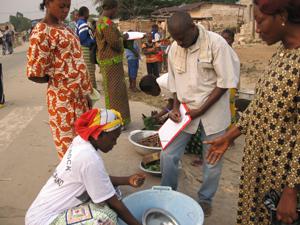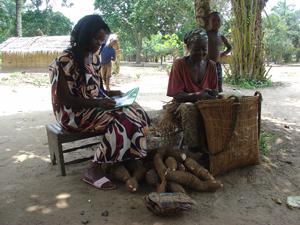Mitchell Eaton
Other projects
9 Oct 2006
Ecology, Conservation and Management of the African Dwarf Crocodile (Osteolaemus tetraspis)
The mission of the Lac Télé Community Reserve is to protect the unique biota of northern Congo’s flooded forests and promote sustainable use of its resources by Reserve villages. The goal of our project is to characterize and quantify the patterns of resource use in order to better direct management activities to ensure best-use practices.

Cohesive communities have managed their own natural resources through traditional customs of ownership and regulations based on natural biotic cycles. Currently, such practices are declining and unmanaged wildlife harvests have resulted in the most widespread form of resource extraction in tropical forests. Central Africa is experiencing rapid human growth rates and threats to the sustainability of tropical wildlife are increasing as bushmeat hunting grows proportionally with human populations, urbanization and transportation infrastructure. Commercial wildlife hunting to supply urban markets has also increased dramatically, threatening numerous species and the livelihoods of rural Africans who depend on wildlife.

The Lac Télé Community Reserve (LTCR) is a flooded forest in northern Republic of Congo established to protect significant populations of wetland birds, crocodiles, gorillas and other endangered fauna. The reserve also provides for the livelihood of 17,000 Bomitaba villagers. A principal goal of the community project is to ensure a sustainable resource-base for communities reliant on fish and wildlife. The LTCR Project has implemented both modern conservation techniques, including anti-poaching patrols and regulations prohibiting commercial export of wildlife outside the Reserve, and adopted traditional community practices, such as the zoning of ancestral hunting and fishing territories, in an attempt to secure sustainable harvests and long-term ecosystem services. To increase the ability of the LTCR Project successfully manage the region’s resources, we have designed a program to monitor hunting, fishing and other extractive activities. This program provides baseline data on harvest rates and dynamics as well as feedback to communities and managers, allowing them to respond adaptively to program interventions and policies. Preliminary tests of the community-based monitoring program, implemented in 5 representative villages under a previous RSG grant, have indicted the monitoring is able to detect seasonal and habitat-specific harvest trends. Data collection is performed by trained local assistants, engaging community members with active involvement in the project and providing some economic input into the community. Data will be used to establish appropriate management guidelines, including protection of core source habitats, alternative resource use, and spatial harvest management techniques. This project also contributes to the research and management capacity of Reserve personnel and community members through direct involvement in all aspects of design and implementation.